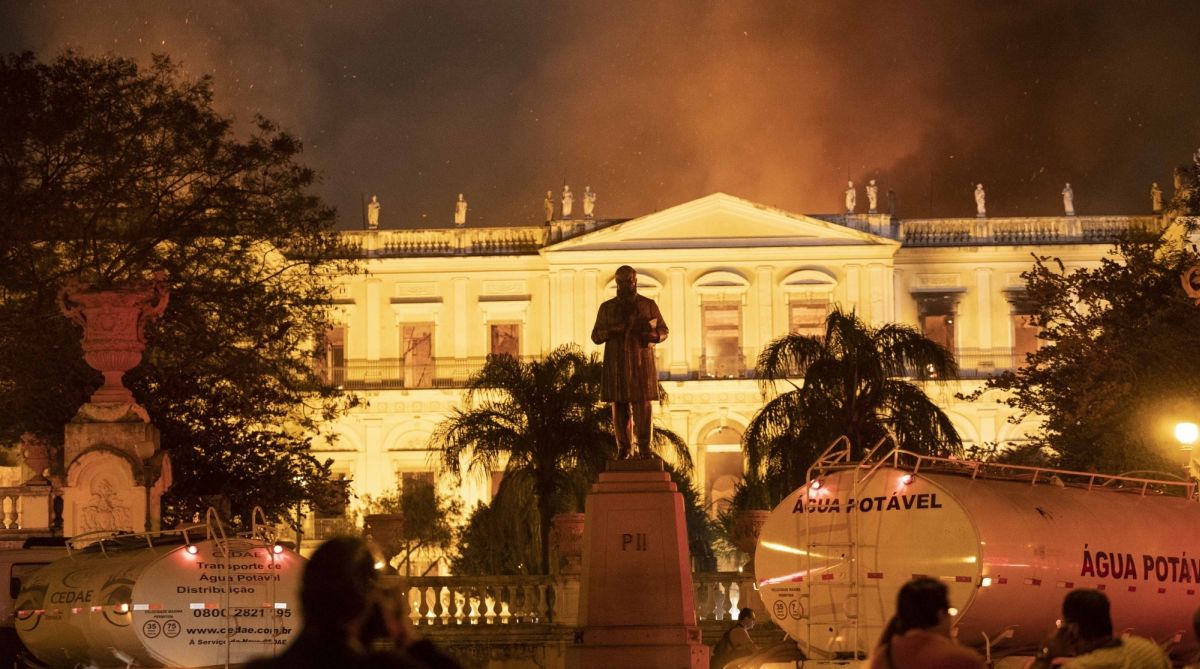PM Modi witnesses presentation of Ramayana in Brazil, hails Jonas Masetti for popularising Indian culture globally
The PM met Jonas Masetti and team after seeing their performance of the Ramayana in Sanskrit.

Photo taken on Sept. 2, 2018 shows the burning National Museum of Brazil in Rio de Janeiro, Brazil. A massive fire on late Sunday raced through Brazil's 200-year-old National Museum in Rio de Janeiro, causing no casualties but probably the total loss of a collection of more than 20 million items. (Xinhua/Li Ming/IANS)
Brazil is traumatised. An important chapter in the Latin American country’s cultural history ~ indeed that of the world ~ has been reduced to ashes. The loss suffered on account of the fire at the National Museum in Rio de Janeiro is yet to be calculated; it could well be beyond hope. While the loss of the structure is hit by the fact that the historical landmark was not insured, the loss of the contents is incalculable. The lapse of the authorities, anxious to promote austerity and cut public spending, has compounded the disaster.
Unlike a country’s political, economic or social history, the reconstruction of a nation’s cultural history is a different kettle of fish altogether. Suffice it to register that no less than 90 per cent of the collection has been destroyed in Sunday’s devastating fire. The remaining ten per cent can perhaps boast the survival of several pieces, pre-eminently the famous Bendegó meteorite and a library of 500,000 books, including works dating back to the days of the Portuguese empire.
The loss has been overwhelming and there may be little or nothing left for the bibliophile or the culture buff to marvel at. Most particularly, the museum’s Egyptology collection has been gutted. A primary source of information, notably empirical evidence on what is today a tormented part of the world, has been lost forever.
Advertisement
The scale of the destruction is clear: although the museum’s smoke-charred exterior walls are still standing and statues still gaze out over the park nearby, little can be seen inside but piles of rubble, left by the cauldron bubble. The discovery of some bones and fragments of a skull on Tuesday has raised hopes that the museum’s centrepiece ~ a 12,000-year-old skeleton known as “Luzia” ~ may have survived.
Yet the “biological anthropology area”, where the fragments were found, also housed dozens of other skeletons. The musem symbolised history etched in stone. Yet reports suggest that the institution has been a victim of austerity, of cuts in public spending by a country that just a few years ago delighted in hosting a soccer World Cup. The general lament is that “a society without culture and research is a failure.”
Both anger and remorse over the disaster is intense; yet many people want to rescue something from this tragedy. Hence the strident appeal for donations from other museums and the return of pieces that had been loaned elsewhere. There is a distinctly emotive connotation to the authorities’ pledge ~ “We will be alive and we will keep research on its feet.” That profound task becomes still more difficult with the destruction of empirical evidence.
Brazil’s National Museum cries out for assistance, both moral and material, from the comity of nations. It has been a loss for the long history of time, to use a variant of Stephen Hawking’s famous expression.
Advertisement